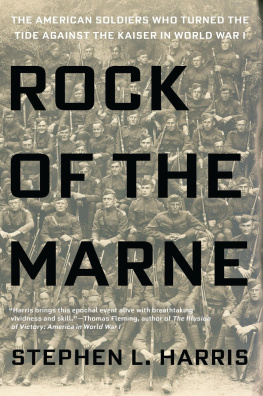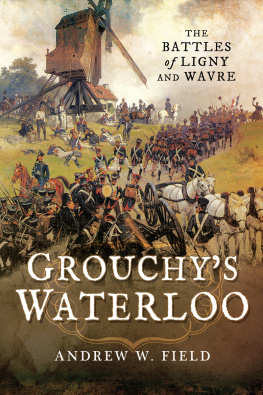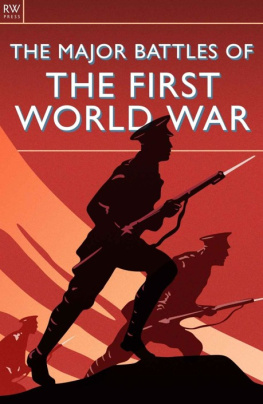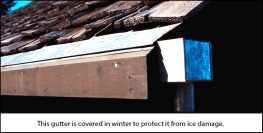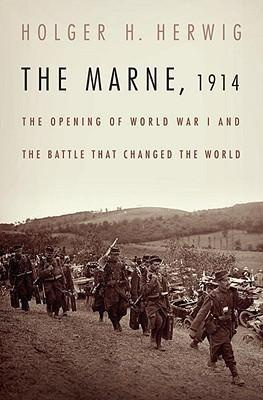This edition is published by ESCHENBURG PRESS www.pp-publishing.com
To join our mailing list for new titles or for issues with our books eschenburgpress@gmail.com
Or on Facebook
Text originally published in 1927 under the same title.
Eschenburg Press 2017, all rights reserved. No part of this publication may be reproduced, stored in a retrieval system or transmitted by any means, electrical, mechanical or otherwise without the written permission of the copyright holder.
Publishers Note
Although in most cases we have retained the Authors original spelling and grammar to authentically reproduce the work of the Author and the original intent of such material, some additional notes and clarifications have been added for the modern readers benefit.
We have also made every effort to include all maps and illustrations of the original edition the limitations of formatting do not allow of including larger maps, we will upload as many of these maps as possible.
The Two Battles of the Marne
The Stories of
MARSHAL JOFFRE
GENERAL VON LUDENDORFF
MARSHAL FOCH
CROWN PRINCE WILHELM
I MARSHAL JOFFRES NARRATIVE
of the Battle of the Marne, as told to Bernard Dsouches, official liaison officer between the French Army and the American Air Service in France. Revised by Major Desmazes, chief of the marshals personal staff.
ON September 5, 1914, as commander-in-chief of the French forces facing the invading German hosts along the river Marne, I issued this order to the gallant troops whose valor was to decide the future of France:
As we are about to begin the battle upon which depends the fate of our country, it is necessary to remind all that the time for retreat has ended. Every effort must be made to drive back the enemy. A soldier who can no longer advance must guard the territory already held, no matter what the cost. He must be killed in his tracks rather than draw back.
How gallantly our troops responded to the call of la patrie all the world knows. Paris, the heart of France, was saved. The Germans were driven back to a line where they dug themselves in. Their dreams of quick conquest were over.
The general staffs plan of campaign was based upon the certainty that the German Empire would have to wage war simultaneously on its eastern and western frontiers. It was advisable, therefore, for the Germans first to concentrate the maximum of power against France, the most dangerous of their adversaries. When France was crushed, they could then turn around and defeat the Russians, who were much slower in mobilizing and getting into action than the French on account of Russias lack of railroads.
The success of this plan depended upon the rapidity and strength of the attack to enable the Germans to dispose of the French. The armies of France had to be defeated before the tsars armies could be in a position to throw the weight of their millions of soldiers into the military balance.
Now the Franco-German frontier fairly bristled with fortresses. The German army, although more liberally equipped with the materials of war than any other nation, could not hope to crash through this fortified barrier, against which the French field forces would set their backs.
Thus, to the German staff, the idea of bringing about an operation in open country presented itself. Such an operation, they believed, would enable them to achieve in the smallest possible time a decisive victory over France.
A glance at the map of Western Europe showed that the only open door to France was through Belgium!
The invasion and violation of Belgium presented many diplomatic complications. But from the military point of view alone, it was logical. And it almost succeeded.
On August 20, 1914, twenty days after the war began, the three armies forming the right wing of the German forces poured out of conquered Namur, at the northern frontier of France, and met the French left and the small British army that had been transported across the Channel from its home base. The torrent of German troops that poured through Belgium could not at first be resisted. The French left wing and the entire British forces were compelled to retreat in order to avoid a catastrophe.
The situation could be saved for the Allies only by a daring and difficult change in our plans. It was on the night of August 25 that I made my decision. The First and Second French armies would remain in Lorraine with orders to oppose the German left, while the armies of our center and left (including the British army), which were bravely and stubbornly opposing the advancing center and right of the Germans, would fall back, pivoting on Verdun, to a line running westward from that city to Laon, La Fre and the high valley of the Somme.
To the east of Verdun lay the Vosges Mountains, with their great forts. Here the First and Second French armies and the Sixth and Seventh German armies opposed each other. None of these armies participated in the battle of the Marne or in the actions leading directly up to it.
To the west of Verdun the French center, made up of the Third Army, under General Sarrail; the Fourth Army under General Langle, and the newly created Ninth Army, under General Foch, faced the Fifth German Army, under the German Crown Prince, the Fourth Army, under the Prince of Wrttemberg, and the Third Army, under General von Hausen.
Still farther to the west the French left, consisting of the Fifth Army under General Lanrezac, and the British army under Field Marshal Sir John French, was opposed to the Second and First German armies under Generals von Blow and von Kluck, respectively.
My plan of August 25, besides calling for a retreat to the lines of Verdun-La Fre, also called for the organization of an entirely new French army to the left and rear of the British army. This was named the Sixth Army, which was put under command of General Maunoury. It began assembling on August 27. It was made up of troops taken from our right in Lorraine, and its task was to prevent the outflanking of our forces by itself outflanking the enemy. Eventually, it would cover Paris.
The days immediately following the 25th saw numerous minor French successes. General Langles Fourth Army on August 27 won a very distinct success on the Meuse River over the army of the Prince of Wrttemberg. The French Fifth Army compelled the German right to stop its pursuit by a fierce counter-offensive at Guise on the 29th, and on the 25th, itself, the French First and Second armies had gained an important defensive victory in Lorraine.
But, in spite of these heartening developments, the arrangement of our forces, instead of being rewelded, continued to become more and more disassociated. The new army of General Maunoury had hardly started unloading in the region of the Somme when the advance guard of Von Klucks army made its appearance there. The French left was compelled to swerve towards Paris. The conditions essential to taking the offensive had not been realized. A new retreat was imposed upon us. The line running westward from Verdun to Laon, La Fre, and the high valley of the Somme had to be abandoned.
Thus, on September 1, I ordered the armies to continue retreating as far as a line resting on the river Seine, still using Verdun as a pivot. The Fifth Army would fall back to Nogent, which is southeast of Paris; Fochs Ninth Army would stop to the south of Arcis on the river Aube, which is a tributary of the Seine, beginning east of Nogent; Langles Fourth Army was to rest to the east of Vitry, on the river Ornain, a tributary of the Marne, beginning northeast of Arcis; and Sarrails Third Army must halt at Bar-le-Duc, also on the Ornain, and northeast of Vitry





